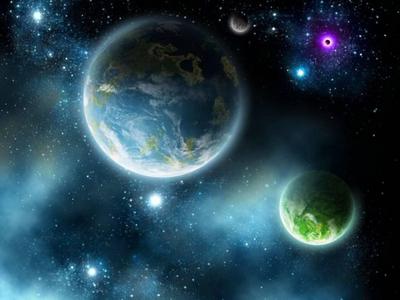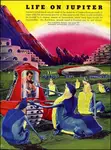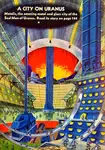The Many-Solar-Systems Interpretation: It's A Small World After All
by A.R.Parwini
(a tiny corner of the universe)

The universe is a big place—a very big place! This may sound like a boring fact to some, or a depressing one even, but for dedicated followers of imaginative fiction it should be a fact to celebrate! For a big universe means one simple thing: room!—room for infinite worlds and infinite interactions between them! And with literature, the ability to zoom in on the most interesting bits!
Perhaps you can see where I'm going with this—infinite Solar Systems, and the vast literary opportunities in such worlds colliding (figuratively, mostly)! After all, if we can invent a Counter-Earth (Hold your horses! There's no page on Counter-Earth yet?! O.o), why not a Counter-Solar-System? It could be dimensionally intertwined with ours, or just a second Solar System, some distance removed from ours, with its own alternate history and inhabitants both familiar and alien.
And literature provides the great opportunity of vagueness — the ability to jump from one perspective to the next and illuminating the subjective element of our reality.
We can follow the journey of Longus, heir to Otto the Conqueror, fleeing the devastation of the latter's interplanetary wars to a new system, a new Earth.
Then we switch to Tika, adopted daughter of a forager tribe chief, witnessing as Longus' massive spaceship crashlands through the Solar System, disrupting Phaeton's orbit and plowing down into the depths of Venus' lava oceans, spreading debris and escape pods along the way.
Many thousands years later, we follow Arro, a self-made orphan adventurer, undertaking the audacious voyage to explore the jungles of Venus, only to discover a pathway leading down to a hollow world with at its center the remnants of a giant, otherworldly machine and inside—something alive!
All these characters need not even be human—Longus could be a metamorphic blob/slug-thing, Tika could be a millipede and Arro could be a salamander-humanoid. We'd only need to find out once they interact and find out sentience can take different forms than their own! A nice way to trick people into expanding their horizons. ;)
(If someone wants to run with this story btw, by all means!)
In this vast literary universe of ours we can even reconcile NSS and OSS, if we want to, it'd certainly be interesting what untold possibilities we can come up with. In a way, all outer-space scifi is a great exercise in astronomical, but also astrological, speculation about the character of stars and planets, and the systems they form.
Godspeed and Kaor to all!
{Comment from Zendexor: Indeed, this dimensional-extension business wants looking at. I believe that the "Earthshimmer" theme, already explored on the site, is in the spirit of what A.R. is saying, but our range of coverage can certainly be further expanded to do the same for other words, in such a way as to preserve the spirit of traditional OSS visions while simultaneously (as it were) squaring and cubing them!
A.R.'s "vagueness" theme in particular is worth following up. Think of the flowing back-and-forth dimensional shift undergone by the meditative Mr Tagomi in the last part of Dick's "The Man in the High Castle". Or the network of time-lines in Laumer's "Worlds of the Imperium". Fascinating possibilities abound, for applying such techniques to OSS tales.}






































